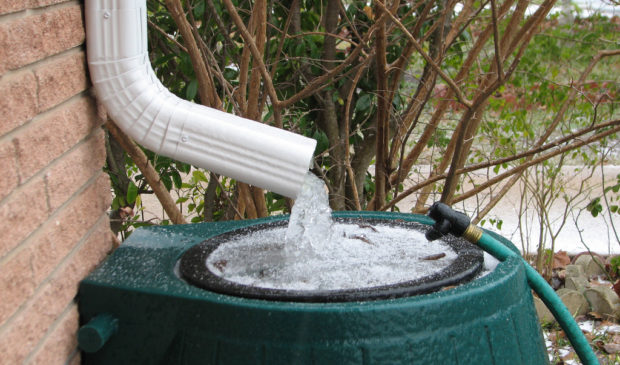Commission OKs drainage discount for rain barrels
Tuesday, June 21, 2016 by
Jack Craver The city’s Environmental Commission endorsed a proposed ordinance last week that will give property owners the chance to lower their drainage fees if they make efforts to reduce runoff from their properties.
Austin Water utility already provides a one-time rebate to homeowners who buy rain barrels and rain gardens, but the Watershed Protection Department decided to get into the discount game as a way to encourage people to adopt green infrastructure, as called for in Imagine Austin, the city’s futuristic comprehensive plan.
Nobody should count on getting rich off the program. The department estimated that for a median home, a standard 55-gallon rain barrel would result in a whopping monthly drainage fee reduction of 22 cents. With a 1,000-gallon cistern, however, the average homeowner will get a monthly discount of $3.63.
Even those discounts come only after you purchase the necessary device. A typical 55-gallon rain barrel costs over $100 and a 1,000-gallon cistern usually runs north of $1,000.
“We’ve scaled the discount to the impact we think it can have on the downstream system,” Saul Nuccitelli, an engineer for the Watershed Protection Department, told the Austin Monitor.
As explained by the department’s memo to the mayor and City Council, the anticipated impact is very small, particularly during major storm events. The department had in the past concluded that such a rebate program would not be an effective use of department funds.
But after considering a number of competing factors, including the beneficial effect on water quality and the general city ecosystem, said Nuccitelli, the department went ahead with the discount plan.
The city had recently been receiving complaints from homeowners who felt it was unfair that they were paying the same drainage fees as property owners who do nothing to mitigate runoff, he said. The current charge, which was approved by Council last year, is calculated based on the amount of impervious cover on a property as well as the percentage of the total property that consists of impervious cover.”
Under the proposed ordinance, 0.6 square feet of impervious cover will be removed from property owners’ bills for each gallon of stormwater-control measures they offer. But they cannot receive a discount for more than 50 percent of their total impervious cover.
For most members of the Environmental Commission, the measure seemed like a nice way for the city to tip its hat to those who were doing their part to reduce flooding.
“I think we need to do something here to encourage these controls to be put in,” said Commissioner Andrew Creech.
“They’re probably spending a lot more on the efforts than they’re going to get (from the discount), but if they’re doing something that’s still just informing themselves and the neighbors that this should be done on a broader scale, then I support the city in their efforts,” added Commissioner Brian Smith.
A couple of others, however, worried that the discount would mostly benefit the well-to-do and send the message that people could get out of paying their drainage fees. Commissioner Erin Gooch said it seemed like the city was “throwing a bone” to people who were taken aback by their increased bills.
“We’re finally getting to the point where people are paying the true cost of drainage or getting closer to that,” she said. “And I just think this kind of undercuts the message we’re sending to the community.”
Chair Marisa Perales added that those who had put in place such measures in the past, before the new drainage fee system was implemented, didn’t do it with the expectation of a financial benefit. Now, she suspected, those with the most impervious cover were having a hard time accepting that they have to pay for their disproportionate impact on the drainage system.
The measure also includes two proposed changes to how drainage fees will be calculated for accessory dwelling units or garage apartments. Currently, the drainage bill for a single-family property with two residences is divided evenly between the two, but the proposal would assess the fee entirely to the primary residence.
Finally, the proposal would exempt all state, county and school district buildings from drainage fees. Previously, city code exempted such properties only if they were “owned and operated” by the public entity using the land, although state law already demands exemptions for state buildings. That change is not expected to have a big impact, since most public buildings are owned by the agency using them and therefore already exempt.
The commission recommended the proposed ordinance 7-3, with Creel, Smith and Commissioners Michael Moya, Richard Grayum, Peggy Maceo, Pam Thompson and Mary Ann Neely in support. Perales, Gooch and Commissioner Linda Guerrero dissented. Commissioner Hank Smith was absent.
Council still must approve the recommended ordinance for it to go into effect.
Photo by Gilbert Garcia made available through a Creative Commons license.
You're a community leader
And we’re honored you look to us for serious, in-depth news. You know a strong community needs local and dedicated watchdog reporting. We’re here for you and that won’t change. Now will you take the powerful next step and support our nonprofit news organization?










